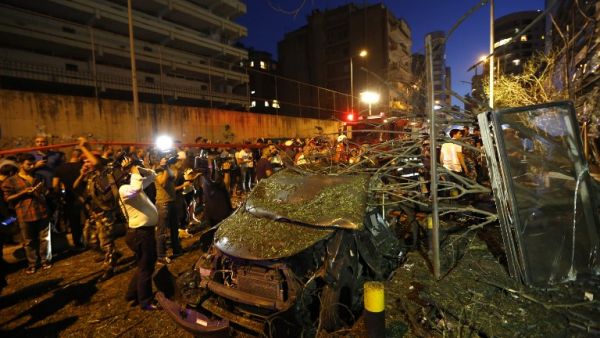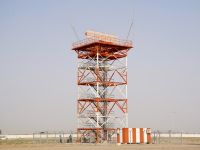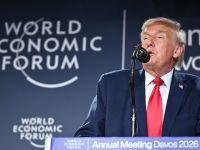Lebanon’s banking sector, already at the center of an escalating crisis over US sanctions against Hezbollah, was jolted Sunday when a bomb blew up outside the Beirut headquarters of one of the country’s top banks, inflicting heavy material damage but only two minor injuries. An explosive device hidden in plants outside BLOM bank headquarters in the Verdun neighborhood went off shortly after 8 p.m. on a mainly deserted street.
One security source said the timing of the explosion, on a Sunday evening while the bank was empty and many people were home breaking their fast, indicated the perpetrators wanted to avoid high human casualties. “It seems more like a message rather than an attempt to cause mass casualties and destruction,” the source said.
“Politically it is clear that target was BLOM Bank only,” Interior Minister Nouhad Machnouk told Reuters news agency, adding that the attack had nothing to do with Daesh (ISIS), which has mounted suicide bombings in Beirut.
The blast did not resemble the deadly explosions that have mostly targeted Beirut’s southern suburbs in recent years, the last of which killed more than 40 people in Burj al-Barajneh, an area where Hezbollah is dominant. That bombing was claimed by Daesh.
There was no claim of responsibility for Sunday’s attack.
Machnouk later told AFP the bomb contained about 3-4 kg of explosives and that it had been “placed behind the back wall” of the bank. The blast, which occurred facing the popular Concorde Center where a movie theater and shops are located, inflicted heavy damage to BLOM’s building and the surrounding area, shattering windows and badly damaging cars in the vicinity.
Several Western embassies in recent days have issued alerts to their citizens asking them not to visit touristic areas. The Canadian Embassy advised citizens Friday not to travel to Downtown Beirut, Hamra or restaurants, and to “avoid large gatherings.”
Former Prime Minister Saad Hariri strongly condemned the bombing. Hariri, who sponsored the annual iftar of the liberal professions sector of the Future Movement in BIEL, said: “Our battle with terrorism, bombings, killings, assassinations and direct and indirect messages is long. This is our battle and we will continue to fight it. Terrorism will not intimidate the Lebanese. We will all confront it and Lebanon will prevail in the end.”
He later in a tweet described the blast as “a dangerous message that requires urgent action from the government and relevant bodies to handle repercussions.”
MP Walid Jumblatt linked the blast to attempts to undermine the Lebanese banking sector after Lebanese banks began complying with a US sanctions law targeting Hezbollah’s finances.
“Lebanon has entered the cycle of bombings targeting the banking sector according to available information,” Jumblatt said in TV interview, adding that Israel is the “first beneficiary” and Hezbollah stands to lose from striking the banking sector.
Finance Minister Ali Hasan Khalil also condemned the bombing, saying it targeted the stability of the banking sector. Lebanese Red Cross chief George Kettaneh said two people were lightly wounded. The two men were later identified as security guards who worked at the bank. They were moved to the American University of Beirut Medical Center to be treated for light wounds.
Security forces cordoned off the area and investigators are reviewing CCTV footage from buildings in the area to determine who planted the device, a source said.Saad Azhari, the head of BLOM Bank, told reporters he had no idea why his bank would be targeted.
“There was no threat,” he said from the site of the blast, rejecting speculation that the bank was hit because of any measures BLOM has taken against any group in Lebanon.
Some banks in Lebanon, including BLOM, have recently been shutting accounts linked to Hezbollah in light of a recent U.S. sanctions law targeting the group’s finances.
Azhari said his bank does not discriminate against anyone in Lebanon and that he would wait for investigations to be completed before any judgments can be made over the reason for the blast.
Last week, Hezbollah slammed Central Bank Gov. Riad Salameh for his position on the U.S. regulations targeting the party’s finances, saying it “is suspicious and shows that the monetary policy has lost its sovereignty.”
Splinters of broken glass covered the street while trees were torn by the explosion. Cars parked near the blast site sustained significant damage.
The Lebanese Army cordoned off the area, as large pieces of glass continued to fall from the bank’s shattered exterior.
Members of the Red Cross, Internal Security Forces and Judicial Police were also on the scene. They were joined later by riot police.
“We were very startled; this is the first time an explosion has happened here,” one resident said as he smoked a cigarette. He said he was home at the time of the explosion.
“When I came out I saw someone who was covered with glass and his head was hit, and we waited for the Red Cross to come.”
The Interior Ministry and Central Inspection Department are both nearby in the area.
“When I parked my car and there were security [personnel for the bank], I greeted them and went to work at around 7 p.m.,” Al-Akhbar newspaper journalist Radwan Mortada told The Daily Star. Mortada’s car, parked near the bank, was completely destroyed by large pieces of falling glass.
“We heard the explosion and went to check it, but then thought there might be another one,” said a security guard who works nearby. “Things happened quickly; we stopped thinking about everything except for a second explosion that might take place.”








